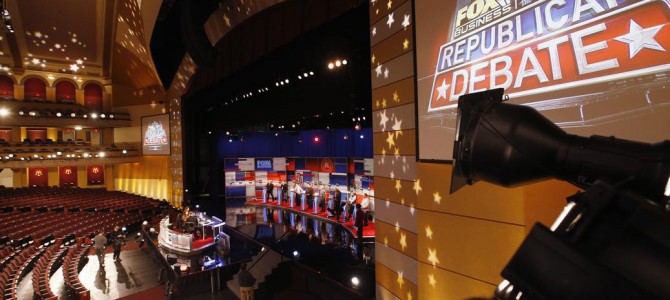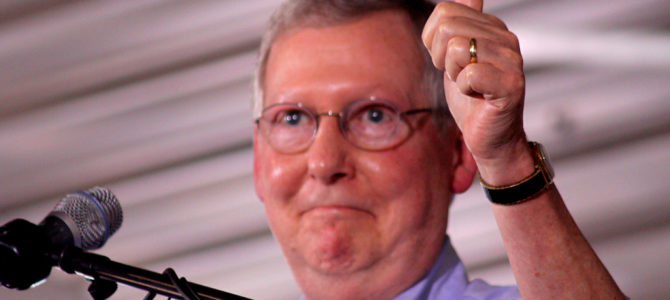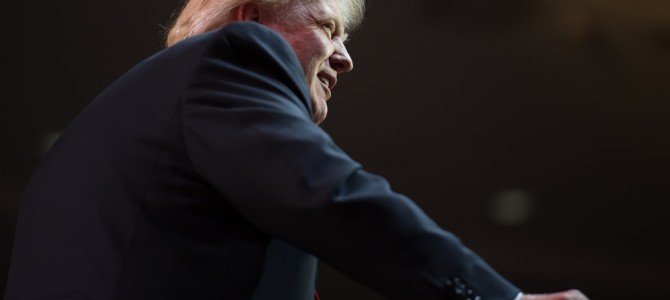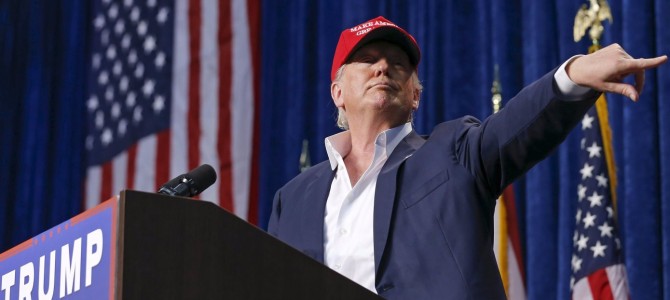
Now that’s an illustration of why moderators matter. The Fox Business debate last night was the best and most substantive debate of the presidential cycle thus far, and it still managed to be interesting (well, unless you’re Glenn Thrush). As it turns out, it’s not that hard to ask serious and challenging questions of the candidates on economic policy. Questions on politicization of the Fed and the hard question of bailouts provoked serious answers from the candidates, and even did so by pushing against the usual assumptions that animate Fox Business’ coverage.
The fights that happened were overwhelmingly about ideology, not personality, and the sparks that flew between the candidates were overwhelmingly based on disagreements about governance and record, not name calling. The Fox Business team and Jerry Seib and Gerard Baker ought to be applauded today for showing everyone how it’s done, and I’m not just saying that because they asked, by my count, 5 out of the 7 questions I hoped they would. And again, this isn’t about ideology – it’s about how serious you want the debate to be. Neal Cavuto can be excused for spiking the football at the end – they deserved it.
The transcript of the debate is here. As for the candidates, in rough order of performance:
TED CRUZ: Ted Cruz proved that he didn’t need to assault the media to turn in an impressive performance. The top four in my view were all ahead of the rest, and could be put in roughly any order, but it was the strong answer to the bailout question that put him over the top in my view. The contrast was obvious – the question was a challenge for Jeb Bush; Ben Carson muddled through with vague promises; and Marco Rubio gave a so-so response; but none of them gave a clear answer on what they would do differently in the same situation. Then Cruz absolutely dominated it. He even got an assist from John Kasich coming in and acting like principles go out the window the instant people are hurting. The 90 second timeframe benefited Cruz enormously, and the moderators kept giving him more time – he ended up with the most talking time of any of them. He jumped into the Paul-Rubio battle very effectively, got past an oops moment without betraying his slip up, and even managed to set up future attacks on multiple candidates. But he’s still pulling his punches on going after others personally. That’s obviously intentional on his part, and probably smart at this stage. Cruz has other challenges as a candidate, but this was the first debate he dominated, and he did so without getting into it with a moderator and without coming off as smug or unlikable.
CARLY FIORINA: Carly Fiorina was very, very good. Her explanation of the financial crisis and the challenge of Dodd-Frank was dead-on. She is the candidate who would probably be benefiting the most from more frequent debating, and she showed this time that she can function effectively without getting into it directly with other candidates (though there was some obvious shade cast at Trump and Kasich). She needed a solid performance to boost herself back into the conversation and avoid slipping to the undercard, and she delivered.
RAND PAUL: Where did this performance come from? I have never ranked Paul’s debate performances as above average to this point, and the last debate I had him last out of every candidate – so this was a surprisingly impressive contrast. Paul managed to disagree with others on stage without seeming peevish about it, defended his tax plan well, and challenged others to defend their policy positions with a good command of the issues. The most notable moment was his clash with Donald Trump’s belligerence on trade – am I wrong to say this is the first time anyone has corrected Trump and called him on his BS and gotten away with it? Trump offered no response, and Paul’s interjection over the music earned him some supportive laughter from the audience. Perhaps the Matt Bevin win reinvigorated him? Paul no longer seems bored with this and ready to go back to the Senate just yet.
MARCO RUBIO: Rubio was coming off his most impressive debate performance, so it’s to be expected that he would slip a little without the foil of Jeb Bush to work against. The 90 second timeframe gave him more space for his mini-speech approach to answers, and he was solid or eloquent on most questions. As for the exchange between him and Paul over the Child Tax Credit: In Rubio’s favor, very few Republicans agree with Paul’s positions on foreign policy and the military, and that’s a perfectly fine dig. But it was less impressive in the larger context of an economic debate. Paul was making an obvious attack on the centerpiece of Rubio’s tax policy, one for which there is an equally obvious and conservative response. Yet Rubio took the bait and wheeled immediately to the “committed isolationist” dig. That works for him, but it also clearly looked like he was trying to change the subject. Rubio should be able to defend his tax plan on its merits in conservative terms – plenty of others do, as an offset of a pre-existing policy bias rather than an example of central planning (he had more of that in the welders v. philosophers portion). Rubio didn’t, and Paul’s attack exposed a nerve that someone like Ted Cruz may look to exploit in the future.
DONALD TRUMP: Donald Trump won this debate. He didn’t win it by being the best debater, or by having great moments, or anything of the kind. He won because he escaped virtually any attack and did nothing to make people back off from supporting him. His arguments on foreign policy and immigration were not effectively rebutted at all by others on stage. His mood was more subdued than prior debates, and he had fewer digs against the other candidates, but he seemed in command of the stage, and only Rand Paul effectively called him out on his normal brand of light-on-facts bluster.
JEB BUSH: Hey, that wasn’t so bad! It was even okay at parts. Certainly a weaker performance compared to the other candidates, but not bad for Jeb – and it was wise for him to avoid gunning at anyone other than Trump and Kasich. His answer on bailouts was weak – he seemed to be in conflict with himself on the followup – but otherwise he did fine. The media narrative that Jeb needed some rockstar performance this time was just dumb – he’s not the one most in danger of slipping off the main stage – he just needed to regain his footing, and I think he largely did.
BEN CARSON: Ooof. Carson seemed very out of his depth in this one. His vagueness on bailouts, taxes, and foreign policy earned him little applause. His answer to the vetting question was fine, but he could’ve turned it more to his benefit. He was more useful to other candidates as a setup man for points than he was to himself. His closing remarks were the best part of his evening, but this was a real step back for him – he is not firmly grounded on economic issues, and it showed. Just promising “I’ll put policies in place to avoid that” is not an indication of seriousness. It’s unlikely to damage him at all, but I doubt this debate helped him resolve many questions.
JOHN KASICH: This debate did help John Kasich resolve a few things – namely, that he is running in the wrong primary. He is, as I understand it, in favor of a higher minimum wage; in favor of bailouts; in favor of Obamacare; in favor of tax favoritism; in favor of Common Core; and in favor of being a dick about all of it. His performance did not go over well with the Frank Luntz panel of New Hampshire voters – he got the worst score ever given a candidate. He absolutely hurt himself with this rude, out of touch performance – the question is how badly, and if he even cares.
As for the undercard debate: Chris Christie was the winner, Bobby Jindal made his appeal to the populist anti-Washington crowd, Mike Huckabee is sleeping on the couch, and Rick Santorum was there.









